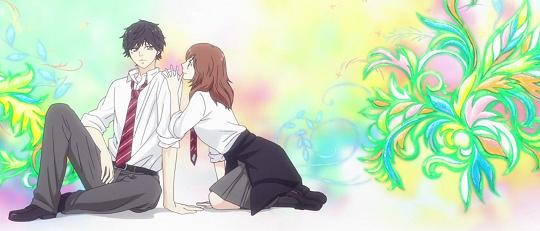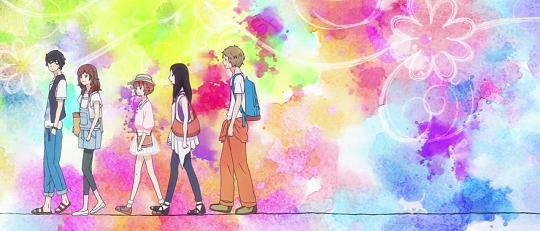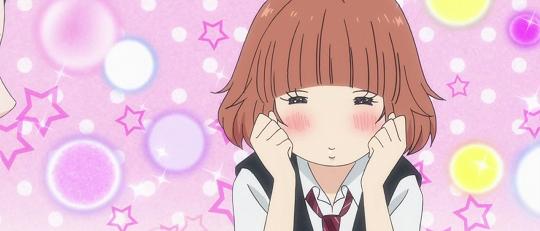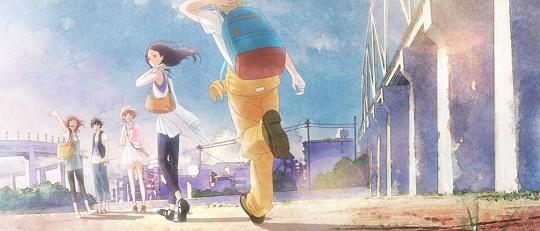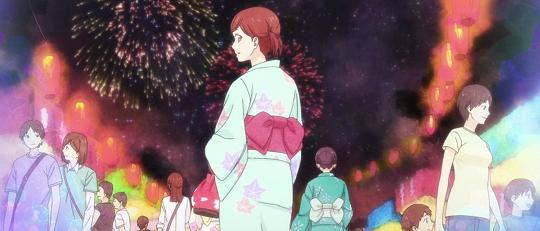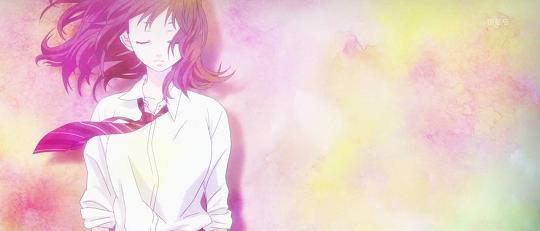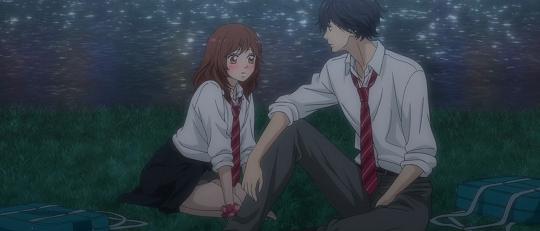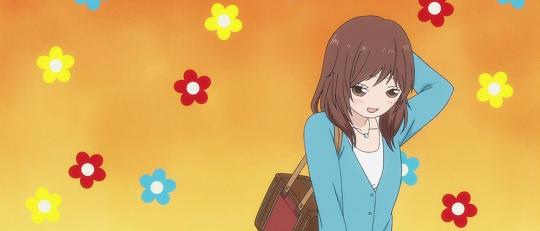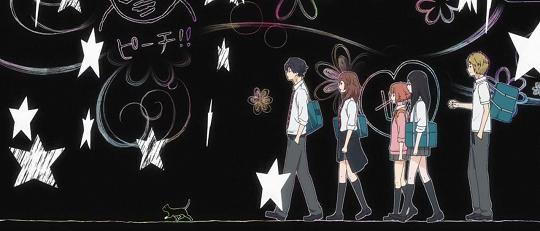I’ll get all the deferential flimflam out of the way first: I know very little about romance manga and anime and, if Ao Haru Ride (Blue Spring Ride) is anything to go by, I know even less about teenagers as well. Though I often try to forget, I too was once an adolescent but due to circumstances I won’t elaborate on, most of that time was, for me at least, spent surviving high school rather than, well, anything that goes on in Ao Haru Ride.
Futaba had a crush on Kou in middle school until he up and disappeared. And now he’s come rocketing back into her life, with floppier hair, a fancy new last name and a whole heap of emotional baggage. Broken bird meet your new caretaker! Or so I thought. What I expected going into the series was a story of teen romance and certainly the opening episode seems to be heading that way. Only it’s less of a teen romance than a teen drama which, when I sloughed off my expectations, turned out to be a lot better than just a straightforward puppy love schmaltz.
The first tip is in the name that, despite digging as much as one can do without speaking the language, probably occupies the area of linguistic pun or common idiom lost on western speakers - much like “Blue Literature” or even the similar sounding but very different film “Blue Spring”. Short version: it doesn’t (seem) to contain any mention of love.
Compare that to my only other touchstone in the genre, Kimi ni Todoke (Reaching You), which is about as straightforward a name - and a romance story - as you can get. That was really the source of my expectations for Ao Haru Ride: smoosh boy and girl together, extract drama, kiss under the stars, job done. That’s not a denigration of either Kimi ni Todoke (which I enjoyed immensely) or the campus romance genre as a whole, only that viewing this series as a romance comes with certain expectations that, to put it bluntly, are not met.
For one, no one is paired up despite copious opportunities to do so. It becomes somewhat of a running gag for viewers that despite all of the things that Futaba and Kou do - not just furtive glances and accidental touches, oh no, full bore hand behind the ear - they neither kiss nor end up amorously entwined.
Instead the locus of the show is on Kou’s interactions in the wake of his absence - for reasons that are eventually explained - from Futaba’s point of view. It initially seems odd that by the end, you know everything about Kou: his circumstances, his family life, his likes, his dislikes; and yet very little about Futaba despite her, ostensibly, being the protagonist. That’s what the majority of the show busies itself with, however it starts very pointedly with Futaba.
Specifically her circle of friends and her approach to life and, demonstrating one of the series’ prevailing themes, changing oneself. Futaba resolves to change herself, thanks primarily to some unsolicited input from Kou. This goes back to what I was saying about my teenage life: I barely had enough emotional maturity to form any kind of lasting interpersonal relationships, let alone the nounce to consciously change myself. <insert flighty musings on the disparity between different genders’ maturation periods>
The question Futaba’s decision raises though is whether she is changing for herself or for Kou. She certainly didn’t seem especially unhappy prior to her introspective revelation and, thankfully, the story doesn’t sugarcoat how difficult the change is for her and does double duty by setting up the final arc of the story which sees a kind of resolution for Kou. It’s a purposely messy situation for him and his actions - apathy, cynicism, overcompensation and late night wanderings - all feel raw and real, sometimes brutally so.
The series handles itself surprisingly deftly though, despite what the imbalance in character development would say otherwise. Little touches such as the cat - featured heavily in the opening and ending sequences - being an analogy for Kou’s brother (he literally wears a jumper that says “Cat boy” on it at one point); and how up until the finale the majority of dialogue from Kou is delivered over his shoulder or with Futaba staring at his back.
Even the bright pastel watercolours of the flashbacks, those halcyon days of middle school, or the blinding orange of a sunrise spent with friends juxtapose the blue-grey concrete of a school in autumn. It’s all stirring stuff and waves the banner for understanding and patience that I’ve never seen in teenagers and did she just nuzzle his hair? That is definitely not a “just friends” action.
In all seriousness though, I came away from Ao Haru Ride with muted indifference, thanks primarily to fickle expectations. I wanted to be filled to bursting with glee as a guy and a girl finally get together after so much much prevarication, blinded by sparkles until I believed in romance again. Instead I got a very thoughtful look at a broken child who is not so much saved as supported by someone who understands him without realising it herself. It has romantic trappings within it - the obvious love triangle being the most egregious - which makes the series seem like it wants to have its cake and eat it, but there is a pleasant straightforwardness and relatability to both Futaba and Kou that makes me want them to get together, just not quite yet.
Ao Haru Ride is not Kimi Ni Todoke despite sharing a studio, some of the animated facial tics and an upcoming live action movie. Tellingly there is actually very little staff crossover and, critically, little of that series’ rose-tinted, misunderstanding led development. Ao Haru Ride is still entertaining and a superbly worthwhile watch but your enjoyment will likely be predicated on your expectations of its genre and it as a genre piece.
